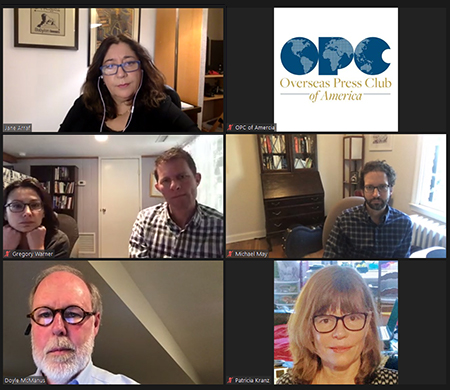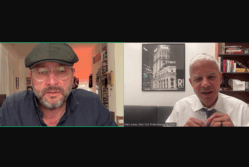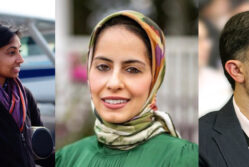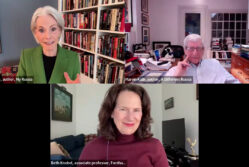Event Coverage Highlight

Andelman/Title Award Winners Discuss Mosul’s ‘Civic Volunteerism’
 by Chad Bouchard
by Chad Bouchard
Walking through the wreckage of Mosul after the routing of Islamic State in 2017, NPR correspondent Jane Arraf, who has covered the Middle East for three decades, witnessed what she called “the most incredible destruction” she had ever seen. As Arraf and local producers toured the abandoned city, she said key questions emerged: “How do you come back from such immense tragedy? How does a city come back from this?”
“People would trickle in, and get permission from the military, and go with civil defense forces, looking for the bodies of their loved ones that they had to bury in the garden, or that they knew had been crushed in debris when buildings fell,” she said.
As the reporting team returned, amid a lack of help from the government or aid organizations, they saw groups of volunteers emerge to rebuild their city on their own, raising funds for those who were struggling to buy food, restoring power and basic infrastructure to devastated areas, and collecting bodies “because nobody else was doing it.”
Those scenes became the foundation of a 40-minute episode of NPR’s “Rough Translation,” titled “D.I.Y Mosul,” which won this year’s David A. Andelman and Pamela Title Award for best international TV, video, radio, audio or podcast reporting showing a concern for the human condition.
On Dec. 2, Arraf, along with colleagues Gregory Warner, Michael May and Sana Krasikov, discussed the story via Zoom as part of the OPC’s ongoing series of interviews with award winners.
Doyle McManus of the Los Angeles Times, who served as head judge on the award jury, moderated.
The winning piece closely follows two particular civic volunteers; Sroor al-Husseini, a 23-year-old nurse who collected bodies and defused suicide belts, and Safwan al-Madani, who created an organization to clean up the city and rebuild infrastructure.
McManus called “D.I.Y Mosul” one of the most illuminating pieces he had ever encountered, because by focusing on particular stories in depth, it explored the fraught and sometimes dangerous relationship between citizens and government authorities.
“Those of us who have covered authoritarian countries cover far too often in the abstract,” McManus said, adding that the winning piece’s focus on two personal stories “really brought home in a what it is like to be an ordinary citizen confronting arbitrary power.”
May, who served as field producer for the episode, said that while the stories covered in the episode demonstrate optimism and hope, they also illustrate frustrations and challenges facing activists, as well as the limitations of their vision.
“They are so apolitical,” he said, noting that some sources recoiled in disgust at the idea of becoming a politician. “They don’t have a vision for a political system that can work for the people, for a true democratic vision of how you could rally the energies that they’ve unleashed in that city in a way that would transform the public sphere.”
Warner said Rough Translation focuses on trying to tell stories about “places far off that hit close to home,” finding relatability in foreign coverage, also “finding the extraordinary in the ordinary.”
“Ultimately, what these characters are up against is many things that we are familiar with,” he said.
Krasikov talked about the process of structuring narratives in the piece a little differently than in traditional journalism, where you might lead with a theme rather than saving it to be revealed at the end.
“It’s all about extracting the motivations of these people. There’s the thing that they’re doing, and then there’s what they really deeply want. And often, if we were to write it as a piece of journalism, we would lead with that,” she said, while in a longform narrative piece they decided to build up to those insights.
When McManus asked Arraf how she hasn’t become jaded during her years reporting on conflicts in Iraq, she contrasted the spirit of volunteerism she found in Iraq with the less optimistic atmosphere in Egypt, where she said “that’s kind of been knocked out of people.”
“In Egypt, when you interview a lot of people, you sense the fear in their eyes. That doesn’t exist so much now in Iraq. What keeps me drawn to that place is that every time I go there, and every person I talk to, I learn something, and my eyes are opened again.”
Click the window below to watch a recording of the whole program, or click here to see a playlist of clips.



